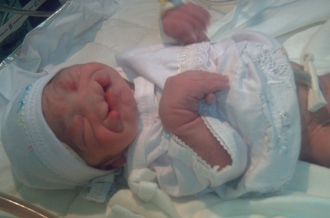What My Escape From Hitler’s Germany Taught Me About Trump’s America
And what Trump’s America teaches us about Netanyahu’s Israel.
By Henry Siegman TODAY 11:28 AM
My first encounter with America was in 1942. That’s when my parents, my five siblings, and I landed in New York following a four-week trans-Atlantic voyage during which our boat, the Serpa Pinto, was boarded by the captain and crew of a German U-boat. We survived that encounter (the captain said he would sink our ship, but either his crew misfired or he changed his mind), as we had somehow survived the previous two years of running and hiding through much of Nazi-occupied Europe and North Africa, always a step ahead of the Gestapo.
Upon arrival in New York, immigration officials confined us to Ellis Island. Because the United States was already at war with Germany, the facility was jammed with Americans of German descent who were being expelled because of their pro-Nazi political activities. All we were aware of was that, at the miraculous moment of our long-hoped-for freedom, we were surrounded by the people we had gone through hell to escape. They spoke in German and greeted each other with shouts of “Heil Hitler!”
I had completely forgotten that brief but nightmarish episode. Seventy-eight years later, Trump’s America brought it back to me, but with a difference. The shouting is now in English; the leader who wants to be heiled is the president of the United States, and his sycophantic heilers this time constitute an entire political party, called the Republican Party.
To those who say that comparisons of Trump’s presidency to Nazi Germany are hyperbolic, I say try telling that to the mothers whose infants have been torn from their arms. A president responsible for such an atrocity exposes a level of cruelty that has no limits. None. Trump has already told us that for him there is little difference between the neo-Nazis in Charlottesville and the Americans who took to the streets to condemn their bigotry.
Unlike his apologists, Trump was entirely open about what he would do if he were to lose his 2016 bid for the presidency, an outcome he and the rest of the country fully anticipated on the eve of the elections. He issued thinly veiled threats that his loss would be seen by his supporters—the ones he assured us would continue to stand with him even if he shot a person on Fifth Avenue in broad daylight—as evidence of a rigged election that would trigger an insurrection. His pal Roger Stone went further, promising a bloodbath if Democrats were to steal the race. Although Trump lost the popular vote—a loss he attributed to massive electoral fraud that, like the unprecedented attendance at his inauguration, existed only in his own imagination—we were spared the promised bloodbath because he prevailed in the Electoral College.
That was in 2016, when Trump had none of the powers he now has as president. With his presidential powers, as well as the support of 90 percent of Republican Party members; the support of the National Rifle Association, whose members own the guns in this country; and the slavish devotion of both congressional Republicans and his cabinet, imagine his reaction if he were to lose the presidential elections in 2020.
To those who say that comparisons of Trump’s presidency to Nazi Germany are hyperbolic, I say try telling that to the mothers whose infants have been torn from their arms.
Trump, of course, has done little to hide his admiration for strongmen, dictators, and other assorted demagogues-for-life. While missing few opportunities to show his contempt for America’s democratic allies and for the institutions and norms that have guided the postwar world these past several generations, Trump has told us of his “very special bond” with Kim Jong-un of North Korea and heaped praise on a rogue’s gallery of autocrats, from the Philippines’ Rodrigo Duterte to Egypt’s Abdel Fattah el-Sisi.
Still, it is Hitler’s power grab in the early 1930s that seems, at times, particularly resonant. Trump’s flagrant lying, unprecedented in the history of the American presidency, is not a personal idiosyncrasy but his way, like Hitler’s, of numbing the public to his usurpation of power that belongs to Congress and the courts. It was Joseph Goebbels who famously wrote that the bigger the lie, the more effective it is. As noted by Timothy Egan of The New York Times, it is also what characterizes Kim’s North Korean regime, “where the masses are forced to believe [their leaders’] lies, something Trump clearly envies. ‘He speaks and his people sit up in attention,’ Trump said of Kim Jong-un. ‘I want my people to do the same.’”
Given the manipulations that Trump and the Republican Party leadership have resorted to in order to stack the Supreme Court with judges who would dance to Trump’s tunes, and given the Republican Party’s subservience to Trump in both houses of Congress, it is not inconceivable that, in a moment of domestic crisis, the US Congress might be asked by Trump to pass legislation that resembles the Enabling Act of March 1933. That was the act that Hitler proposed to the conservative parties of the deadlocked Bundestag, giving him the power to rule Germany “temporarily,” without parliament, until the crisis subsided.
What is frightening about today’s America is how much the pass that Germans were willing to give Hitler mirrors the pass the Republican Party and too many Americans have been willing to give Trump. As Timothy Egan asked in his column, “when the Trump toxins have gotten deep into the national bloodstream,” how much will the evil Trump might yet do be seen as acceptable? That is a question that should trouble all Americans. Who can be confident of his answer, now that we know Trump considers migrants seeking asylum in America to be an infestation, a term that was applied by Hitler to the Jews?
The shock and trauma of the first 18 months of Trump’s presidency—and the growing realization that his autocratic grandstanding isn’t an act but a true threat to democracy—has hidden from view a transformation of the State of Israel that is as radical as Trump’s transformation of America, and perhaps more lasting and irreversible.
Since its founding in 1948, Israel has presented itself to the world as an avatar of democracy and guardian of the moral truths the world needs to learn about the Holocaust. Yet its governmental leaders and a majority of its Jewish citizens—led by its prime Minister, Benjamin Netanyahu—have fully embraced Trump (as well, in some instances, as the authoritarian leaders embraced by Trump).
Giant posters and photographs of Trump were recently plastered on the streets and public places of Jerusalem and Tel Aviv. Declaring “Trump is a friend of Zion” and “Trump Make Israel Great,” they expressed adoration of the man who doubled down on his insistence on the moral equivalence of neo-Nazis in Charlottesville and the Americans who took to the streets to express their abhorrence of these racists and anti-Semites.
At the time, Netanyahu, who has strong opinions about every conceivable subject, said not a word about Trump’s defense of the neo-Nazis. But then, Netanyahu also had nothing to say to his fellow citizens, or to Jews outside of Israel, when his own son, whom he has been grooming for future political leadership in the Jewish state, invoked anti-Semitic iconography in an outburst against what he and his father consider self-hating Israeli Jewish leftists, i.e., human-rights advocates.
There is an appalling consistency to Netanyahu’s aping of Trump’s proclivity for racist and xenophobic autocrats, many of them—like the political leaders of Poland—with a long history of antisemitism. Victor Orbán, Hungary’s president, was just received as an honored guest by Netanyahu in Jerusalem. For the past three years, Orbán has been running a defamation campaign in his country that portrays George Soros, the financier and human-rights activist, as a vulture-beaked predator and puppet master—classic anti-Semitic imagery taken directly from Goebbels portrayal of Jews in Nazi Germany. When, at the request of an outraged local Jewish leadership, Israel’s ambassador to Hungary issued a statement earlier this year demanding the removal of the anti-Semitic posters, he was slapped down by Netanyahu, who formally retracted the ambassador’s criticism. According to Haaretz, Netanyahu’s intervention left the Hungarian Jewish community reeling.
CURRENT ISSUE
View our current issue
Subscribe today and Save up to $129.
Nothing could have been more powerfully symbolic of the political transformation that Israel has undergone than the coincidence of the arrival in Israel of Hungary’s president with the adoption by the Knesset of a constitutional change in Israel’s Basic Laws redefining Israeli national identity. Netanyahu, a principal advocate of the new definition of Israel as “the nation state of the Jewish people,” correctly described what happened as a “defining moment in the annals of Zionism and the annals of the state of Israel.” For Israel now resembles Orbán’s Hungary far more than it does the Israel of its founders. Netanyahu would have little reservation plastering Orbán’s posters libeling Soros on the streets of Tel Aviv and Jerusalem as Orbán did in Budapest, if he thought he would not pay a price for it with American Jews.
Referring to Trump’s encounter with Putin in Helsinki, David Duke, the former head of the Klan, tweeted “Bravo Trump!”—prompting Egan’s observation that “the ex-Klan man is just a goose step ahead of the party that has been remade in Trump’s image.” The ex-Klan man may also be just a goose step ahead of the country that is being remade in Trump’s image.
That Nathan Sharansky, rightly celebrated in Israel for his courageous battle for human rights in the Soviet Union nearly half a century ago, could have authored a column in The New York Times reminding the world of Andrei Sakharov’s heroic struggle for an open society without including even one word on the decision of the government of which he has been a part to formalize the closing of its Jewish society to its Arab citizens speaks volumes of his tone-deafness and the hopelessness of Israel’s democracy.
Israel’s betrayal of the liberal principles it espoused at the time of its birth has already begun to create an alienation between Israeli and American Jewry that, in time, will become irreconcilable, if only because the apartheid reality Israel has created in the Jewish state is utterly irreconcilable with democracy. No matter how loudly Israeli leaders will continue insisting on Israel’s democratic character, American Jewry—other than many of its Orthodox components—will not accept a version of Judaism that sacrifices democracy to religious doctrine, keeps millions of Palestinians under permanent military occupation, and whose religious authorities treat American Conservative and Reform Jews, who constitute the vast majority of Americas Jews, as members of a non-Jewish faith.
For the longest time, the conventional wisdom in both the United States and Israel has been that, given intermarriage and other assimilatory forces in this country, American Jewry cannot hope to survive without religious and cultural infusions from the “Jewish homeland” in Israel. But I believe it will become increasingly clear that American Jewry will not abide the narrow, highly nationalistic, and anti-democratic Judaism in Israel.
American Judaism will survive because it possesses the spiritual and intellectual resources to develop and thrive in counterpoint to an Israeli version of Judaism that is and will remain under the political control of a medieval orthodoxy. The younger generation of American Jews has already begun to reject the contemptuous Israeli notion that unquestioning political support of the policies of right-wing Israeli governments (or left-wing governments, for that matter) constitutes a sufficient Judaism for American Jews, or for Jews anywhere.
The longer-range consequences of the changes now occurring in Trump’s America are more difficult to foresee. Despite the deep internal political and cultural cleavages that Trump’s presidency has opened in the United States, and the deep scars they will leave in this country’s political economic and cultural life, the dramatic increase in the political involvement of activists who are younger, female, and far more liberal than seen previously in Democratic circles, are reasons to avoid despair. But of this I am certain. If Trump is reelected in 2020, the United States will no longer be a democracy. Under his presidency this country has already become a force that undermines the cause of democracy. Authoritarian leaders everywhere have been emboldened by his “successes,” a gift of which Trump is entirely proud.
The only uncertainty is whether America’s democracy will survive if Americans will allow him to serve out his current term.
Henry Siegman
Henry Siegman is President Emeritus of the U.S./Middle East Project and a past senior fellow at the Council on Foreign Relations. He formerly headed the American Jewish Congress and the Synagogue Council of America.
And what Trump’s America teaches us about Netanyahu’s Israel.
By Henry Siegman TODAY 11:28 AM
My first encounter with America was in 1942. That’s when my parents, my five siblings, and I landed in New York following a four-week trans-Atlantic voyage during which our boat, the Serpa Pinto, was boarded by the captain and crew of a German U-boat. We survived that encounter (the captain said he would sink our ship, but either his crew misfired or he changed his mind), as we had somehow survived the previous two years of running and hiding through much of Nazi-occupied Europe and North Africa, always a step ahead of the Gestapo.
Upon arrival in New York, immigration officials confined us to Ellis Island. Because the United States was already at war with Germany, the facility was jammed with Americans of German descent who were being expelled because of their pro-Nazi political activities. All we were aware of was that, at the miraculous moment of our long-hoped-for freedom, we were surrounded by the people we had gone through hell to escape. They spoke in German and greeted each other with shouts of “Heil Hitler!”
I had completely forgotten that brief but nightmarish episode. Seventy-eight years later, Trump’s America brought it back to me, but with a difference. The shouting is now in English; the leader who wants to be heiled is the president of the United States, and his sycophantic heilers this time constitute an entire political party, called the Republican Party.
To those who say that comparisons of Trump’s presidency to Nazi Germany are hyperbolic, I say try telling that to the mothers whose infants have been torn from their arms. A president responsible for such an atrocity exposes a level of cruelty that has no limits. None. Trump has already told us that for him there is little difference between the neo-Nazis in Charlottesville and the Americans who took to the streets to condemn their bigotry.
Unlike his apologists, Trump was entirely open about what he would do if he were to lose his 2016 bid for the presidency, an outcome he and the rest of the country fully anticipated on the eve of the elections. He issued thinly veiled threats that his loss would be seen by his supporters—the ones he assured us would continue to stand with him even if he shot a person on Fifth Avenue in broad daylight—as evidence of a rigged election that would trigger an insurrection. His pal Roger Stone went further, promising a bloodbath if Democrats were to steal the race. Although Trump lost the popular vote—a loss he attributed to massive electoral fraud that, like the unprecedented attendance at his inauguration, existed only in his own imagination—we were spared the promised bloodbath because he prevailed in the Electoral College.
That was in 2016, when Trump had none of the powers he now has as president. With his presidential powers, as well as the support of 90 percent of Republican Party members; the support of the National Rifle Association, whose members own the guns in this country; and the slavish devotion of both congressional Republicans and his cabinet, imagine his reaction if he were to lose the presidential elections in 2020.
To those who say that comparisons of Trump’s presidency to Nazi Germany are hyperbolic, I say try telling that to the mothers whose infants have been torn from their arms.
Trump, of course, has done little to hide his admiration for strongmen, dictators, and other assorted demagogues-for-life. While missing few opportunities to show his contempt for America’s democratic allies and for the institutions and norms that have guided the postwar world these past several generations, Trump has told us of his “very special bond” with Kim Jong-un of North Korea and heaped praise on a rogue’s gallery of autocrats, from the Philippines’ Rodrigo Duterte to Egypt’s Abdel Fattah el-Sisi.
Still, it is Hitler’s power grab in the early 1930s that seems, at times, particularly resonant. Trump’s flagrant lying, unprecedented in the history of the American presidency, is not a personal idiosyncrasy but his way, like Hitler’s, of numbing the public to his usurpation of power that belongs to Congress and the courts. It was Joseph Goebbels who famously wrote that the bigger the lie, the more effective it is. As noted by Timothy Egan of The New York Times, it is also what characterizes Kim’s North Korean regime, “where the masses are forced to believe [their leaders’] lies, something Trump clearly envies. ‘He speaks and his people sit up in attention,’ Trump said of Kim Jong-un. ‘I want my people to do the same.’”
Given the manipulations that Trump and the Republican Party leadership have resorted to in order to stack the Supreme Court with judges who would dance to Trump’s tunes, and given the Republican Party’s subservience to Trump in both houses of Congress, it is not inconceivable that, in a moment of domestic crisis, the US Congress might be asked by Trump to pass legislation that resembles the Enabling Act of March 1933. That was the act that Hitler proposed to the conservative parties of the deadlocked Bundestag, giving him the power to rule Germany “temporarily,” without parliament, until the crisis subsided.
What is frightening about today’s America is how much the pass that Germans were willing to give Hitler mirrors the pass the Republican Party and too many Americans have been willing to give Trump. As Timothy Egan asked in his column, “when the Trump toxins have gotten deep into the national bloodstream,” how much will the evil Trump might yet do be seen as acceptable? That is a question that should trouble all Americans. Who can be confident of his answer, now that we know Trump considers migrants seeking asylum in America to be an infestation, a term that was applied by Hitler to the Jews?
The shock and trauma of the first 18 months of Trump’s presidency—and the growing realization that his autocratic grandstanding isn’t an act but a true threat to democracy—has hidden from view a transformation of the State of Israel that is as radical as Trump’s transformation of America, and perhaps more lasting and irreversible.
Since its founding in 1948, Israel has presented itself to the world as an avatar of democracy and guardian of the moral truths the world needs to learn about the Holocaust. Yet its governmental leaders and a majority of its Jewish citizens—led by its prime Minister, Benjamin Netanyahu—have fully embraced Trump (as well, in some instances, as the authoritarian leaders embraced by Trump).
Giant posters and photographs of Trump were recently plastered on the streets and public places of Jerusalem and Tel Aviv. Declaring “Trump is a friend of Zion” and “Trump Make Israel Great,” they expressed adoration of the man who doubled down on his insistence on the moral equivalence of neo-Nazis in Charlottesville and the Americans who took to the streets to express their abhorrence of these racists and anti-Semites.
At the time, Netanyahu, who has strong opinions about every conceivable subject, said not a word about Trump’s defense of the neo-Nazis. But then, Netanyahu also had nothing to say to his fellow citizens, or to Jews outside of Israel, when his own son, whom he has been grooming for future political leadership in the Jewish state, invoked anti-Semitic iconography in an outburst against what he and his father consider self-hating Israeli Jewish leftists, i.e., human-rights advocates.
There is an appalling consistency to Netanyahu’s aping of Trump’s proclivity for racist and xenophobic autocrats, many of them—like the political leaders of Poland—with a long history of antisemitism. Victor Orbán, Hungary’s president, was just received as an honored guest by Netanyahu in Jerusalem. For the past three years, Orbán has been running a defamation campaign in his country that portrays George Soros, the financier and human-rights activist, as a vulture-beaked predator and puppet master—classic anti-Semitic imagery taken directly from Goebbels portrayal of Jews in Nazi Germany. When, at the request of an outraged local Jewish leadership, Israel’s ambassador to Hungary issued a statement earlier this year demanding the removal of the anti-Semitic posters, he was slapped down by Netanyahu, who formally retracted the ambassador’s criticism. According to Haaretz, Netanyahu’s intervention left the Hungarian Jewish community reeling.
CURRENT ISSUE
View our current issue
Subscribe today and Save up to $129.
Nothing could have been more powerfully symbolic of the political transformation that Israel has undergone than the coincidence of the arrival in Israel of Hungary’s president with the adoption by the Knesset of a constitutional change in Israel’s Basic Laws redefining Israeli national identity. Netanyahu, a principal advocate of the new definition of Israel as “the nation state of the Jewish people,” correctly described what happened as a “defining moment in the annals of Zionism and the annals of the state of Israel.” For Israel now resembles Orbán’s Hungary far more than it does the Israel of its founders. Netanyahu would have little reservation plastering Orbán’s posters libeling Soros on the streets of Tel Aviv and Jerusalem as Orbán did in Budapest, if he thought he would not pay a price for it with American Jews.
Referring to Trump’s encounter with Putin in Helsinki, David Duke, the former head of the Klan, tweeted “Bravo Trump!”—prompting Egan’s observation that “the ex-Klan man is just a goose step ahead of the party that has been remade in Trump’s image.” The ex-Klan man may also be just a goose step ahead of the country that is being remade in Trump’s image.
That Nathan Sharansky, rightly celebrated in Israel for his courageous battle for human rights in the Soviet Union nearly half a century ago, could have authored a column in The New York Times reminding the world of Andrei Sakharov’s heroic struggle for an open society without including even one word on the decision of the government of which he has been a part to formalize the closing of its Jewish society to its Arab citizens speaks volumes of his tone-deafness and the hopelessness of Israel’s democracy.
Israel’s betrayal of the liberal principles it espoused at the time of its birth has already begun to create an alienation between Israeli and American Jewry that, in time, will become irreconcilable, if only because the apartheid reality Israel has created in the Jewish state is utterly irreconcilable with democracy. No matter how loudly Israeli leaders will continue insisting on Israel’s democratic character, American Jewry—other than many of its Orthodox components—will not accept a version of Judaism that sacrifices democracy to religious doctrine, keeps millions of Palestinians under permanent military occupation, and whose religious authorities treat American Conservative and Reform Jews, who constitute the vast majority of Americas Jews, as members of a non-Jewish faith.
For the longest time, the conventional wisdom in both the United States and Israel has been that, given intermarriage and other assimilatory forces in this country, American Jewry cannot hope to survive without religious and cultural infusions from the “Jewish homeland” in Israel. But I believe it will become increasingly clear that American Jewry will not abide the narrow, highly nationalistic, and anti-democratic Judaism in Israel.
American Judaism will survive because it possesses the spiritual and intellectual resources to develop and thrive in counterpoint to an Israeli version of Judaism that is and will remain under the political control of a medieval orthodoxy. The younger generation of American Jews has already begun to reject the contemptuous Israeli notion that unquestioning political support of the policies of right-wing Israeli governments (or left-wing governments, for that matter) constitutes a sufficient Judaism for American Jews, or for Jews anywhere.
The longer-range consequences of the changes now occurring in Trump’s America are more difficult to foresee. Despite the deep internal political and cultural cleavages that Trump’s presidency has opened in the United States, and the deep scars they will leave in this country’s political economic and cultural life, the dramatic increase in the political involvement of activists who are younger, female, and far more liberal than seen previously in Democratic circles, are reasons to avoid despair. But of this I am certain. If Trump is reelected in 2020, the United States will no longer be a democracy. Under his presidency this country has already become a force that undermines the cause of democracy. Authoritarian leaders everywhere have been emboldened by his “successes,” a gift of which Trump is entirely proud.
The only uncertainty is whether America’s democracy will survive if Americans will allow him to serve out his current term.
Henry Siegman
Henry Siegman is President Emeritus of the U.S./Middle East Project and a past senior fellow at the Council on Foreign Relations. He formerly headed the American Jewish Congress and the Synagogue Council of America.






























